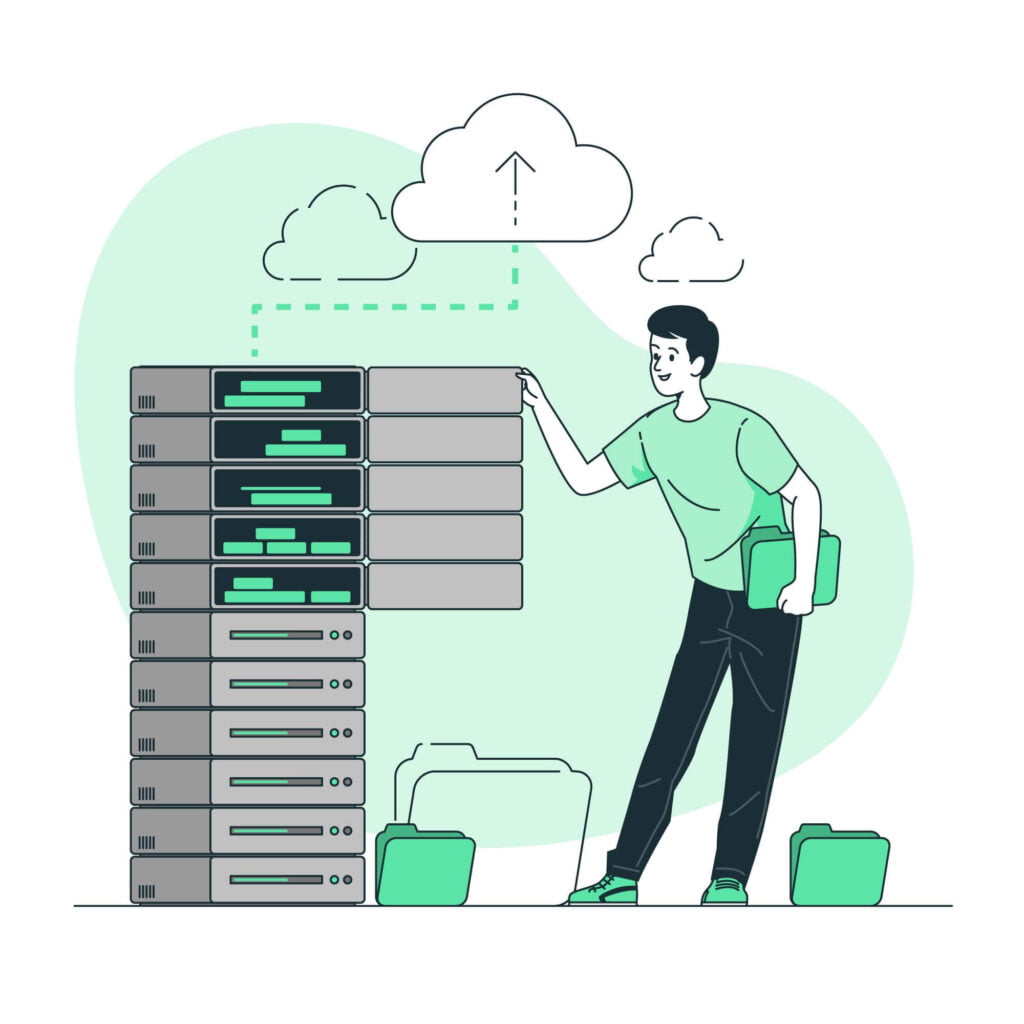Hosting, also known as website hosting, is a service provided by companies (hosting service providers) that provide physical server capacities or parts of them to store websites or files. In this section, we will look at what hosting services include and why they are important for websites.

Definition of Hosting
Hosting is a service in which hosting service providers provide server space and resources to host websites, thus helping websites to be accessible on the Internet. In this section, we will describe the basic hosting features that help websites to be efficient and secure.
Hosting features
Hosting services offer various features to keep websites running. In this section, we will discuss in detail the main features of hosting services that are important for websites.
Server capacity and resources: This is where all the website files, images, text, databases, etc. are stored. The hosting plan determines how much storage you will have.
Data transfer limits: The amount of data that can be sent between the server and the users. If the limits are exceeded, the website may become unavailable. This usually happens when the advertising services of opinion leaders are used and a large number of users visit the site at the same time. After the number of users is reduced, the website starts working again.
Support and technical assistance services: An important feature to get technical help if the site is experiencing problems or needs advice.
Security: Security features such as SSL certificates, strongly encrypted login information, regular data backups and firewalls ensure that the site is protected from malicious activity.
Choosing between a shared or dedicated server: Some hosting providers offer a shared server that hosts various websites of other businesses, while others offer a specialized server for just one website or client. The choice depends on the needs of your site.
How to choose the right supplier
Choosing the right hosting provider is an important decision that affects the performance and security of your website. In this section, we will discuss in more detail the most important aspects to consider when choosing a hosting provider.
Website security
Security is one of the most important factors to consider when choosing a hosting provider to ensure the level of protection for your data and website.
- SSL certificates: An explanation of what an SSL certificate is and how it contributes to data encryption and security for user data and the website.
- Firewall and security software: We will discuss what kind of security software the hosting provider provides, whether they have a firewall installed, DDoS attack protection, continuous security updates, and more.
- Regular security updates: It is important that the hosting service provider regularly updates its system in order to avoid security holes and ensure a high level of security.
- Data backup and recovery: What is the data backup system, how often is the data backed up and how easy is it to restore the site data.
- Malware detection and removal: How the hosting provider detects and removes malware, viruses or other potentially dangerous elements.
Customer reviews and ratings
- Reviews on the site: How websites or portals that provide objective and reliable reviews of service providers can help you understand the quality of services provided.
- Social networking groups or forums: How communities and discussions on the Internet (eg Reddit, specialized forums) discussing different hosting providers can provide useful information from customer experiences.
- Customer service efficiency: We will discuss how effective and fast the service provider's customer service is based on customer reviews.
- Ratings and rankings: How different platforms provide ratings and rankings for hosting providers and how these ratings can help you form an opinion.

How to choose the right plan
Choosing the right hosting plan is an important step as it will directly affect your website's performance, availability and resource usage.
Comparison of hosting plans
Important things to note when choosing a website hosting plan:
- Feature comparison: How do different plans differ in the features they provide, such as disk space, data limits, email number of mailboxes, etc.
- Prices of different plans: Comparison between plan prices and what you get for a given price.
- Website traffic and number of visits: How much traffic and how many visits your website can receive in order to choose the right level of server resources.
- Disk capacity and data transfer limits: How much storage and data your website needs based on your website content and traffic.
- Flexibility of plans: Is it possible to quickly and easily upgrade or downgrade your plan if your website needs change?
- Future scaling: Ability to increase site traffic or resources in the future if your site grows.
This framework will help you better understand what criteria are important in choosing the right hosting plan based on the specifics of your website and future needs.
Shared hosting
Hosting providers offer a variety of server types and services that may vary in terms of server architecture, availability, and flexibility.
Advantages of a shared server:
- Low costs: This hosting service is cheaper because server resources are shared with other users, reducing costs.
- Simplicity: This type of hosting is easy to install and manage, ideal for beginners as you don't need to have a lot of technical knowledge.
- Technical support: Most providers offer technical support, which can be helpful, especially if there are problems with the site.
- Setting speed: A quick setup that results in your website being available online in no time.
Disadvantages of a shared server:
- Site performance: High traffic from other websites can affect the performance of your website, especially if other websites attract a large number of visitors.
- Resource limitations: Server resources (such as disk space, data transfer limits) are limited and may cause performance limitations.
- Security risks: A shared server may be less secure because you are sharing a server with other sites, so malware from one site can infect others.
- Flexibility: Limited flexibility, you won't be able to fully customize the server to your liking.
These pros and cons will help you better understand whether shared hosting is the right type for your website's needs. Since this is a popular and simple solution, it is important to weigh its pros and cons before making a decision.
Private server (VPS hosting)
Private server (VPS hosting) characteristics:
The characteristics of a private server (VPS hosting) are related to the resources, flexibility and level of control provided by this type of hosting. Here are some key features of VPS hosting:
Differences from a shared server: VPS hosting is an intermediate option between a shared server and a dedicated server. This means that separate virtual environments are created on the physical server, which act as separate parts of the private server.
Greater flexibility: VPS hosting offers more flexibility and control compared to a shared server. You are allowed to have your own separate operating system, and you can customize the server settings and resources according to your needs.
Resource isolation: Each virtual private server environment is isolated from the others, so your websites run independently of the activities of other VPS hosting users.
More server resources: VPS hosting provides more resources (disk space, RAM, CPU power) than shared server hosting, but not as much as a dedicated server.
Distribution options: VPS hosting allows you to flexibly adjust resources according to your needs and as the number of website visits increases.
Security: Isolation and control gives you more control over server security because you have more discretion in choosing and configuring security measures.
Average cost-benefit ratio: VPS hosting is often more expensive than shared server hosting, but it offers more control and more resources than a shared server plan.
These features help you understand how VPS hosting differs from other types of hosting and what benefits it can provide, giving you more flexibility and control over your online project.
Dedicated hosting
Dedicated hosting features provide maximum server control and resource capabilities, as it is a physical server dedicated only to your website. Here are the main features of a dedicated server:
Physical server: A dedicated server is a physical machine that you rent outright from a service provider. It is only for your website or project.
Maximum control: You are given complete control and flexibility. You have the opportunity to customize the operating system, configure server parameters and resources, as well as install the necessary programs or plugins.
High resource capacity: A dedicated server provides huge disk space, RAM memory, processor power and other server resources. It allows you to handle large data flows and complex projects.
High performance: Your website or project can run faster and more stable because you don't have to share resources with other users or websites.
High level of security: Dedicated servers provide a higher level of security. You have more control over security measures and can further customize the server's security settings.
Distribution options: Dedicated servers allow you to easily scale a website or project, add or change resources as your needs grow.
High level of reliability: The physical server is dedicated solely to your use, reducing the risk of website disruptions due to the activities of other users.
These features of a dedicated server provide maximum flexibility, control and resources for your website or business needs, but it can be a more expensive solution compared to other hosting options.
Cloud hosting
- Flexibility: Cloud hosting provides an opportunity to easily and quickly change or flush server resources as required. This allows you to adapt to changes in website traffic or growing needs.
- Availability and reliability: Due to the fact that resources are distributed among many servers, if one server goes down, other servers can take over the load, ensuring that the website remains available.
- Payment for used: Many cloud service providers use a pay-as-you-go approach, allowing you to pay only for the resources you actually use.
- High resource capacity: Cloud hosting often offers great scalability, allowing you to use as many resources as you need.
- Automated backup: Many cloud services automatically back up your data, keeping your data safe.
- Security: Cloud services often have a strict level of security, but security can vary from provider to provider.
- Mobility: You can manage your server resources and access data from any device with an internet connection.


